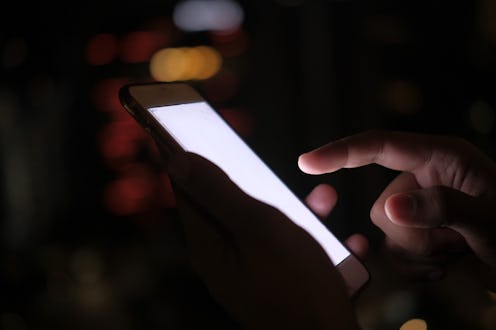
Don't freak out just yet, you guys, but using your phone in the dark could lead to some pretty serious side effects — namely "transient smartphone blindness," aka temporary vision loss caused by staring at our smartphones after lights out. We've all done it, right? I quite literally end every single night playing on my phone in bed, trying to while away the time until my insomnia finally lets me fall asleep. But given the findings of a recent case documented in the New England Journal of Medicine, I'll probably rethink my nocturnal activities (or, at the very least, limit my late night screen time).
Here's what you need to know about this curious phenomenon: According to LiveScience, the first case documented in the Journal was that of a 22-year-old woman whose late night phone usage had been linked to trouble seeing out of her right eye for several months. A battery of tests ruled her otherwise entirely healthy. The second case came by way of a 40-year-old woman who, like the other subject, was proven to be in excellent health. She reported difficulty seeing out of one eye for up to 15 minutes in the morning.
If at this point you're starting to think this diagnosis is inevitable in your near future, take heart in the following: We're only talking about two patients at this point, and ophthalmic specialists speculate the women's transient smartphone blindness may have much to do with the way they were laying. You see, when chronicling their symptoms, both women revealed their vision problems were always in the eye on the opposite side of the body than the side they were laying on. Doctors posited this could very well be due to a pillow partially blocking the eye on the side the patients were laying on. That eye would therefore partially adapt to the dark, while the other eye would adjust to the bright light of the bluescreen. Then, when both eyes enjoy the same unobstructed view again, the eye that hadn't adjusted to the dark (depending on when the viewing is occurring) would read as blind until it readjusts again.
So don't stress about this phenomenon too much just yet. However, that doesn't mean you shouldn't take a few simple precautions now to protect your eyes from strain where staring at your phone screen is concerned. Check out these pointers.
1. Don't Lay On Your Side
It stands to reason that if lying on your side could be causing this transient blindness that perhaps lying on your back or belly would reduce the risk. That way, both eyes are even and adapting to the same view.
2. Give It A Rest
If, like me, you tend to have marathon late night smartphone sessions, try to break every 20 minutes by looking away from your phone and focusing your eyes somewhere else — say, across the room. This is known as the 20-20-20 rule: Take a 20-second break every 20 minutes to look at something 20 feet away.
3. Dim Your Screen
Since it's been proven that starting at the blue light from screens disrupts your sleep cycle anyway, you can potentially improve your snoozing and reduce eye strain by simply dimming your phone screen.
4. Turn On A Light
This may seem counter-intuitive if you're trying to go to sleep. But, let's be real — if you're playing on your phone, you aren't actually ready to go to sleep yet. Eye strain can be caused, as referenced in this latest research's findings, by excessively bright light or extreme shifts in the light spectrum (i.e. going from dark to light or vice versa). Turning on a low-wattage bedside lamp should help solve this problem.
5. Try "Palming"
Sounds kind of weird, I know. However, Dr. Edward Kondrot touted this technique to CNN, calling it "meditation for the eyes." Basically, you close your eyes, place the palms of your hands over them, and then take deep slow breaths. This relaxes your eye muscles and can rejuvenate them during long stretches looking at artificial light.
Images: Towfiqu Photography/Moment/Getty Images; Giphy (5)